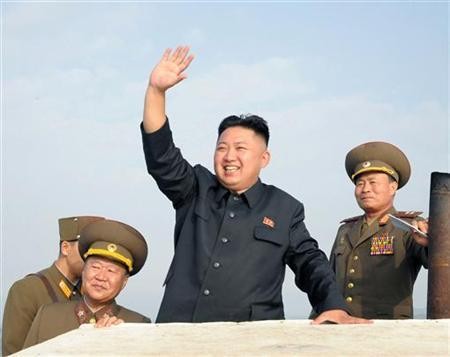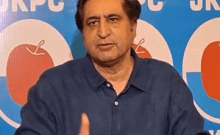
North Korea appears to be changing its tactics in dealing with its Southern counterpart. It has shifted from a confrontational, head-on and aggressive speech-making tactic to a slightly retiring and diffident mode, if the recent developments are any indication to go by.
In what looks like a complete change in its approach, North Korea on Saturday vowed that it would take the first step to fulfill its proposal, made earlier this week, to end inter-Korea tensions, a revelation that will certainly raise a few eyebrows.
Is it the same North Korea which grabbed overwhelming international attention last year with its infamous near-daily, aggressive rhetoric and threats of nuclear war with Seoul and Washington every now and then?
"Our will to fulfill the latest important proposal is solid," Rodong Sinmun, a daily newspaper run by the North Korean government said. "As we have declared, we will first show our actions to fulfill it," it added.
The Rodong Sinmun report comes just two days after the reclusive regime urged the two sides of Korea to end all slander. It reiterated that it was North Korea's 'unwavering stance' to improve inter-Korean relations and achieve unity, the South Korean Yonhap reported.
Urging the two sides to take mutual steps to prevent a "nuclear disaster", the North's powerful National Defense Commission said that Seoul must halt plans to hold a joint military exercise with the US, scheduled from February to April. The most interesting aspect of the North Korea conversation is not its content but its nature.
South Korea brushed off the North's proposal, even after China urged the Koreas to improve ties. Some Seoul officials could not help describe the North's latest reconciliatory gesture as a "camouflaged peace offensive." Indeed there are good reasons why they could be right.
After its notorious 12 February underground nuclear test that North Korea undertook last year, the reclusive communist regime was left desperately alone, facing criticism from all sides. The joint US-South Korea military drill, which shortly followed, left the solitary regime simmering in angry outburst.
Sandwiched between the need to uphold one's image in front of the North Korean citizens and the need to confront the world after having genuinely provoked the international community, Kim Jong-un seemed to have thought the best way forward was to push itself being unreasonably defensive and use what was called as 'saber rattling' tactic.
A wave of near-daily, strongly worded, aggressive and verbose rhetoric started getting bombarded towards Seoul and Washington, that left the international community stunned. North warned a few times that they would reduce the the two cities into a "sea of fire". No government had ever seen or heard anything like that before.
Almost one year into the future, here is a North Korea which is urging, rather meekly, that it is ready to do everything it can to ensure peace in the peninsula. It is indeed a well-orchestrated and well-planned shift in its approach. Pushing itself into the defensive and 'peace' mode, Pyongyang is likely saving itself from taking the blame in the event of a major war.
It seems to have finally realized that firstly, its words will not be taken with credibility, unless it comes entwined with action. But warning of a nuclear war and not actually waging it, the isolated country has already earned itself a namesake of a barking dog that seldom bites.
Secondly, it is becoming increasingly difficult for people to survive in the desperately malnourished, impoverished and cash-strapped communist nation. If one knowingly closes one's nose and mouth to stop breathing, he would be compelled to have some air when it becomes impossible to hold any further.
After the recent execution of his own uncle by Kim Jong-un, North Korea is literally in the crosshair of missiles from all directions, placed in a pre-emptive and 'combat readiness' mode. Faced with the reality that the joint US-South Korea military drills will be carried out despite their repeated requests, North has found itself in a desperate political grid-lock from where it cannot escape, unless it chooses to withdraw itself.

















